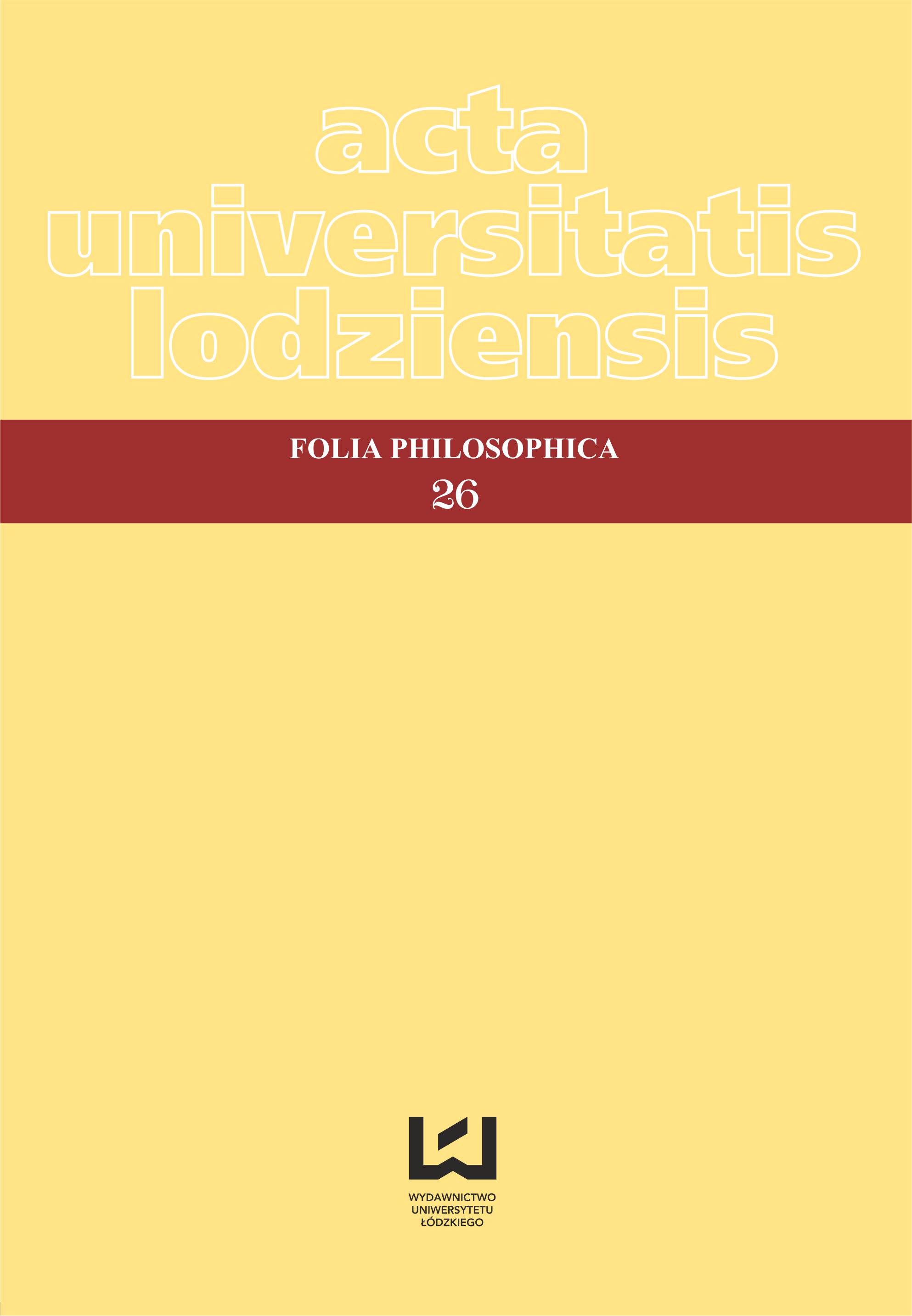Konsekwencje eksternalistycznego sposobu rozumienia znaczeń wyrażeń językowych oraz treści stanów mentalnych
DOI:
https://doi.org/10.18778/0208-6107.26.09Abstrakt
Semantic externalism is one of the most popular and thoroughly discussed standpoints in the contemporary philosophy of language. Briefly speaking, it is a position which claimes that the meanings of linguistic expressions or contents of mental states depend on the nature of beings that exist in the real world and on the language practices of the community. In the paper I present briefly views of the most famous representatives of externalism: Saul Kripke, Hilary Putnam and Tyler Burge, and present typical objections against semantic externalism. Opponents of this position pay attention not only to the limitation of Kripke's and Putnam's causal theory of reference, but also attempt to prove that the meanings of linguistic expressions or the contents of mental states depend on the biological and psychological characteristics of the individual. I point out the ontological and epistemological consequences of externalism resulting from the adoption of this standpoint, and also try to identify the main merits and difficulties of this position.Bibliografia
Burge T. (1979), Individualism and the Mental [w:] “Midwest Studies in Philosophy”, nr 4, 73-121.
Google Scholar
DOI: https://doi.org/10.1111/j.1475-4975.1979.tb00374.x
Burge T. (1988), Individualism and Self-Knowledge [w:] “Journal of Philosophy”, nr 85, 649-65.
Google Scholar
DOI: https://doi.org/10.5840/jphil1988851112
Burge T. (1995), Filozofia języka i umysłu [w:] A. Bronk (red.), Filozofować dziś, Lublin, 93-139.
Google Scholar
Evans G. (1993), Przyczynowa teoria nazw [w:] B. Stanosz (red.), Filozofia języka, Warszawa, 226-45.
Google Scholar
Floyd J. (2005), Putnam’s „ʻMeaning of Meaning’”: Externalism in Historical Context, [w:] Y. Ben-Menahem (red.), Hilary Putnam, Cambridge, 17-48.
Google Scholar
DOI: https://doi.org/10.1017/CBO9780511614187.002
Fodor J. (1987), Psychosemantics: The Problem of Meaning in the Philosophy of Mind, Cambridge.
Google Scholar
DOI: https://doi.org/10.7551/mitpress/5684.001.0001
Fodor J. (2001), Eksperci od wiązów. Język Myśliński i jego semantyka, Warszawa.
Google Scholar
Fodor J. (2011), Język myśli. Lot 2, Warszawa.
Google Scholar
Gokieli M. (2003), Problem eksternalizmu w programie semantycznym Fodora [w:] „Przegląd Filozoficzno-Literacki”, nr 4 (6), 187-201.
Google Scholar
Gostkowski B. (2007), Wiele twarzy eksternalizmu semantycznego [w:] „Kognitywistyka i Media w Edukacji”, nr 1-2, 69-81.
Google Scholar
Grobler A. (2001), Problem zdań bazowych jako test w sporze między internalizmem a eksternalizmem [w:] „Filozofia Nauki”, nr 2 (34), 81-7.
Google Scholar
Horwich P. (2006) The Nature of Meaning [w:] M. Devitt, R. Hanley (red.), The Blacwell Guide to the Philosophy of Language, 43-58.
Google Scholar
DOI: https://doi.org/10.1111/b.9780631231424.2006.00005.x
Kobos K. (2010), Eksperymenty myślowe jako narzędzie badawcze we współczesnej analitycznej filozofii umysłu, Łódź (nieopublikowana rozprawa doktorska).
Google Scholar
Kripke S. (1988a), A Puzzle About Belief [w:] Salmon N., Soames S. (red.), Propositions and Attitudes, Oxford, 102-48.
Google Scholar
Kripke S. (1988b), Nazywanie a konieczność, Warszawa.
Google Scholar
Loar B. (1996), Social Content and Psychological Content [w:] A. Pessin, S. Goldberg (red.), The Twin Earth Chronicles: Twenty Years of Reflection on Hilary Putnam’s “The Meaning of ‘Meaning’”, 180-92.
Google Scholar
Loar B. (2006), Language, Thought and Meaning [w:] M. Devitt, R. Hanley (red.), The Blacwell Guide to the Philosophy of Language, 77-91.
Google Scholar
DOI: https://doi.org/10.1111/b.9780631231424.2006.00007.x
Maciaszek J. (2008), Znaczenie, prawda, przekonania. Problematyka znaczenia w filozofii języka, Łódź.
Google Scholar
Mill J. S. (1962), System logiki dedukcyjnej i indukcyjnej, Warszawa.
Google Scholar
Odrowąż-Sypniewka J. (2006), Rodzaje naturalne. Rozważania z filozofii języka, Warszawa.
Google Scholar
Poczobut R. (2007), Eksternalizm treści umysłowej a superweniencja [w:] „Kognitywistyka i Media w Edukacji”, nr 1-2, 82-103.
Google Scholar
Prechtl P. (2009), Leksykon pojęć filozofii analitycznej, Kraków.
Google Scholar
Putnam H. (1993) Znaczenie i referencja [w:] B. Stanosz (red.), Filozofia języka, Warszawa, 246-57.
Google Scholar
Putnam H. (1998) Znaczenie wyrazu ‘znaczenie’ [w:] H. Putnam, Wiele twarzy realizmu i inne eseje, Warszawa, 93-185.
Google Scholar
Skalski T. (1987), Teoria bezpośredniego oznaczania Saula Kripkego i Hilarego Putnama [w:] „Studia Filozoficzne”, nr 3, 3-21.
Google Scholar
Świątczak B. (2007), Superweniencja a internalizm treści mentalnej [w:] „Kognitywistyka i Media w Edukacji”, nr 1-2, 107-18.
Google Scholar
Szubka T. (1998), Eksternalizm w filozofii umysłu i jego konsekwencje [w:] „Ruch filozoficzny”, nr 3, 471-7.
Google Scholar
Zemach E. (1996), Putnam’s Theory of Reference of Substance Terms [w:] A. Pessin, S. Goldberg (red.), The Twin Earth Chronicles: Twenty Years of Reflection on Hilary Putnam’s “The Meaning of ‘Meaning’”, 60-9.
Google Scholar
Ziemińska R. (2002), Eksternalizm we współczesnej epistemologii, Szczecin.
Google Scholar
Pobrania
Opublikowane
Jak cytować
Numer
Dział
Licencja

Praca jest udostępniana na licencji Creative Commons Attribution-NonCommercial-NoDerivatives 3.0 Unported License.












